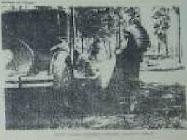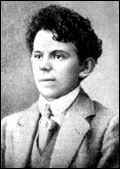A quick follow-up : another facet of this riddle of gender & the Bible. To proceed from what we said in #22 : if God's personhood includes a capability to act out gender roles & sexuality (as humans tend to do)... what further can we say? Well, as is true with a lot of things, but maybe especially with eros & sexuality - once you start looking, you see it just about everywhere.
Sacred symbols of Sky-father and Earth-mother originated long before Biblical times, back in prehistory. Many were the archaic cultures organized by religious concepts like this, centered on seasonal rituals of sacred "weddings" - hieros gamos - on hilltops and temple-tops. This background can be heard also in the Bible - though Yahweh was also careful to emphasize his cosmic transcendence and invisibility, his difference from the other gods.
Yet the sexual dimension and the erotic imagery are there, in both Jewish & Christian texts. Israel is the "spouse" of Yahweh; the Church is the "bride" of Christ; the (feminine) soul espouses Jesus through the Holy Spirit. Jesus both reigns and is expected as the coming Bridegroom; the Song of Songs - Solomon's lyric paean to erotic desire and wedded bliss (to summarize reductively) - is a key book for both faiths. I think of the erotic terms with which some of the saints, like St. Bonaventura, San Juan de la Cruz, or Teresa of Avila, expressed their "spiritual ravishment" in meditation.
In fact if one looks at Christian doctrine and the sacrament of Eucharist in this light, one could say that, at least in traditional terms, the pre-existent, spermatic Logos - the Word, which spoken, generated all creation - becomes Man, and marries His Spouse, the Church (and the individual soul) : and out of this spiritual marriage are re-born into "new life" the offspring of this union - the spiritual children of God. Thus, the bread & wine of the sacrament take on an almost Dionysian aspect, and the Church becomes the site of an ongoing, vital hieros gamos - a spiritual seduction, epithalamic and "fruitful" in every sense.
This whole view of things sounds less strange when we remember that the first story in the Bible - in Genesis, of Adam and Eve - is the story of Man's fall from grace through an abandonment of God, a forsaking of God through the temptation of the flesh. The Song of Songs was attributed to King Solomon, "foremost in wisdom" : perhaps we can understand all this as part of the wise (unfathomable) providence of God. Since men & women fell through Eros, then perhaps God's most effective means of redeeming them might be through the "erotics" of the Logos.
"Wise as serpents, innocent as doves." This interpretation illustrates St. Paul's theme, that when Christ became Man, he plumbed the "heights & depths". But I believe that Paul would also reiterate - along with the other fathers & mothers of the church - that it must be a part of God's wise providence to harness (by means of the "song" of scripture) human eros to the ends of agape and caritas : these more profound and universal forms of love. For, as Jesus says, "unless you become as little children, you cannot enter the kingdom of God." Agape and caritas are the fire-tested foundation of that deeper communion, which transforms us, alchemically, from creatures of mere need and selfish desire into imago Dei - children of God - capable of radiating love, freedom & affection : a spiritual fire of pure, self-giving generosity.
12.03.2012
Subscribe to:
Post Comments (Atom)



No comments:
Post a Comment